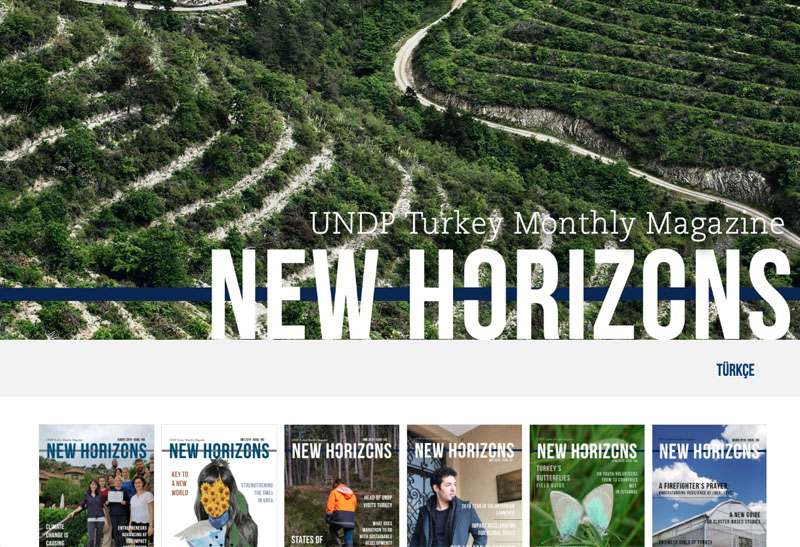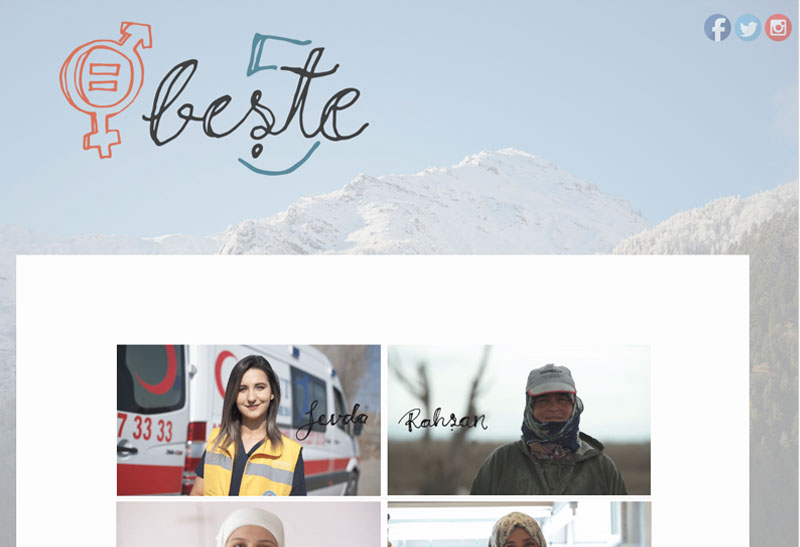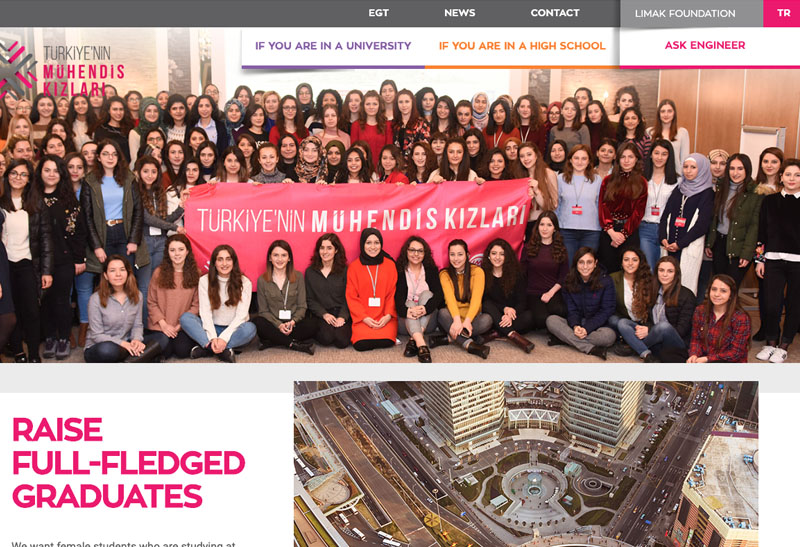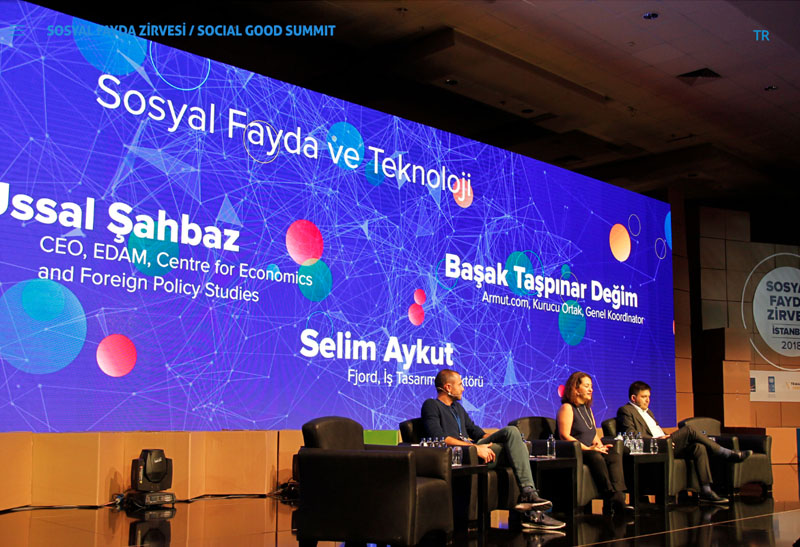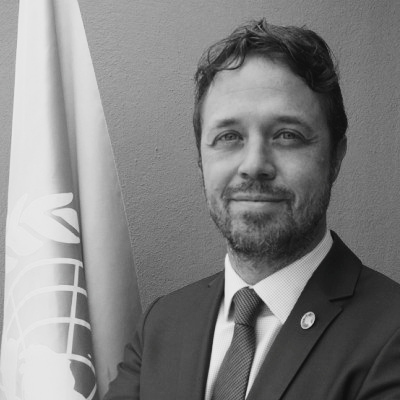
Claudio Tomasi
Resident Representative
UNDP in Turkey
We are pleased to present this new publication providing information about some of the initiatives which UNDP supported in Turkey in 2017 and 2018. These initiatives were only possible thanks to close collaboration with our numerous partners and the generous contributions of our donors. Special recognition goes to the Government of Turkey for our fruitful partnership.
As the leading UN Agency in the field of development and largest development network, we are providing support to the Government of Turkey in its efforts to implement the 2030 Agenda to achieve the Sustainable Development Goals by 2030.
We are always seeking to identify and implement innovative and practical ways of making people’s lives better and protecting our planet for future generations. Through our website, Twitter, Instagram, Facebook, LinkedIn and YouTube accounts, our monthly e-magazine New Horizons and other communications channels, we make a point of sharing stories of people whose lives have been changed for the better thanks to the activities of UNDP. We encourage you to discover these people’s stories and see the impact UNDP has had on their lives. We hope that their stories will give hope to others and inspire them both to empower themselves and lead better lives and to develop solutions to help others in need.
UNDP Turkey
Programme and Project Tree
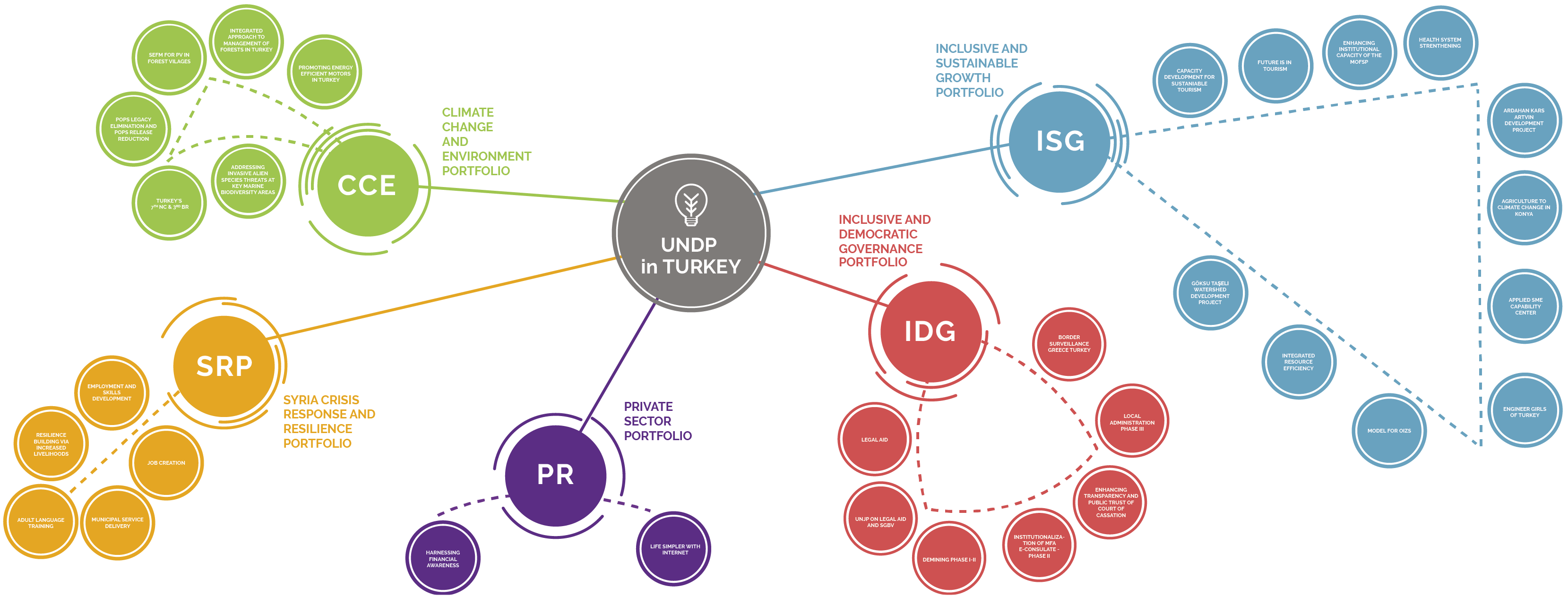
Results 2017
2017 in Review
Following the referendum in April 2017, the parliamentary system of government was replaced with an executive presidency. Most of the changes brought about by the Constitutional Amendment entered into force in 2018, when general and presidential elections were held simultaneously.
On the economic front, a swathe of governmentled stimulus packages has helped sustain economic growth and employment in 2017. The pace of UNDP’s activities accelerated under strong Government stewardship.
In 2017, preparations for the 11th National Development Plan (NDP) began (E3). The strong presence of UNDP in the NDP ad-hoc commissions was an opportunity for UNDP to produce a policy impact on development goals moving forward, aligning them with the Sustainable Development Goals (SDG) nationalization process.
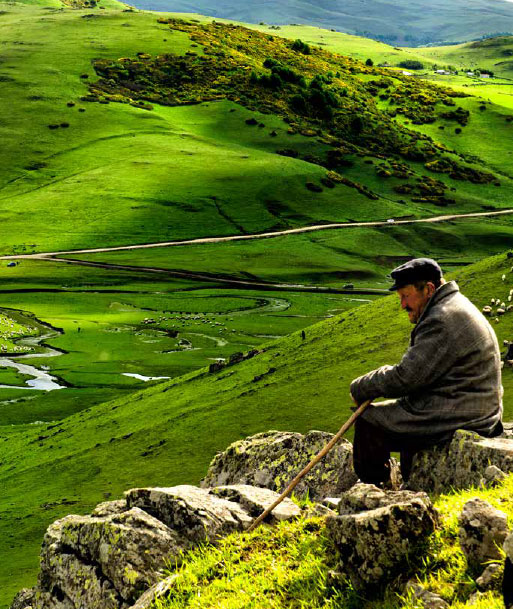
Turkey was hosting around 3.4 million Syrians at the end of 2017 (E4), more than 2.9 million of whom were living outside of camps, alongside host communities. Although Syrians have brought economic benefits to communities, the mass influx has also placed a deepening strain on local communities, especially in terms of access to basic services, as well as employment and livelihood opportunities. Given the protracted nature of the crisis, the Country Office steered its efforts towards medium and longer-term development gains for both host communities and Syrians.
The strong presence of UNDP in the National Development Plan ad-hoc commissions was an opportunity for UNDP to produce a policy impact on development goals moving forward, aligning them with the SDG (Sustainable Development Goals) nationalization process.
The resilience component budget under the 3RP (Regional Refugee and Resilience Plan) ballooned by over 100% compared to 2016 and was expected to grow further in all sectors in 2018. The resilience budget rose from USD434 million in 2017 to USD539 million in 2018. The shift in focus was also reflected in the Country Office’s strategic priorities and through the expansion of the UNDP Syria Crisis Response and Resilience Programme in 2017.
Progress on gender equality remained a matter of great concern in all fields, even though key policy documents were renewed in 2017.
The new documents were:
- National Action Plan for Combating Violence against Women
- Draft National Strategy and Action Plan on Combating Early and Forced Marriages
- Draft National Strategy and Action Plan for Women’s Empowerment
Development Results
Gender Development Results
- On this theme, for the GEN1 marker, we spent $10,604,300 in 2017 with 4 project outputs. For the GEN2 marker, our expenditure was $1,124,921 with 3 project outputs.
- Regarding participation of women and girls, for the GEN3 marker, we spent $220,710 in 2017 with 3 project outputs.
- Regarding sustainable, inclusive growth and development, for the GEN1 marker, we spent $18,090,564 in 2017 with 23 project outputs. For the GEN2 marker, our expenditure was $4,549,936 with 6 project outputs.
- Regarding environment, climate change and biodiversity, for the GEN1 marker, we spent $2,245,204 in 2017 with 5 project outputs. For the GEN2 marker, our expenditure was $237,008 with 2 project outputs.
Results 2018
2018 in Review
2018 was a benchmark year for Turkey in both political and socio-economic terms. With the presidential and parliamentary elections, Turkey put an end to its parliamentary system of government and adopted a presidential system.
With the Syria Crisis in its eighth year, Turkey still hosts the largest number of refugees and asylum-seekers in the world, and economic, humanitarian and social challenges persist. Considering the protracted nature of the refugee situation, a progressive shift from humanitarian to development assistance has been prioritized by the Government as well as the donor community, with a focus on inclusion, self-reliance and providing sustainable socio-economic support and livelihood opportunities within Turkey. UNDP has achieved leverage with its strong and clear comparative advantage and added value in Turkey in its engagement in the Syria Crisis Response.
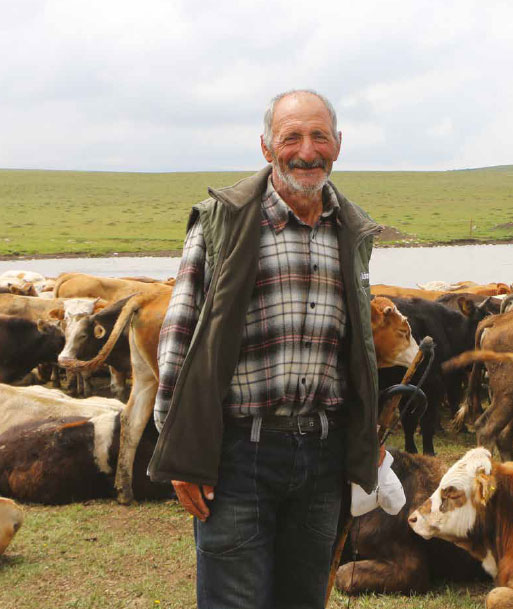
The Turkish economy followed a downward course in 2018. Following a robust performance in 2017, when GDP grew by 7.4%, economic growth slowed progressively.
Turkey’s economic outlook increases the importance of the work of our country office, such as providing policy advice on total factor productivity for sustainable growth. Country office programmes to create an enabling environment for job creation for Syrians and members of the Turkish population, with a specific focus on women, have been leveraged in the short and medium-term programmes of the Government.
In order to operationalize the Strategic Plan and the concept of the “integrator platform” in Turkey, the country office initiated the Business for Goals Platform (B4G) and Connecting Business Initiative (CBi) with private sector umbrella organizations.
Development Results
A. Sustainable, Inclusive Growth and Development for All
- Through the project on Total Factor Productivity, UNDP published the first-ever white paper on this subject in Turkey.
- An Applied SME Capability Centre (Model Factory) was established in Ankara with the aim of increasing the capabilities of SMEs.
- Trial training programmes were provided to 50 companies and 164 participants (25% of them women) in Ankara within the last quarter of 2018.
- “Enhancing the Use of Wood” and the GEF-funded “Promoting Low Cost Energy Efficient Wooden Buildings in Turkey” projects started in late 2018 to increase energy efficiency and the use of renewable energy.
B. More Effective Policies and Practices on Sustainable Environment, Climate Change and Biodiversity
- 28 management plans were finalized for 5 pilot areas.
- Target of reaching 450,000 hectares of land under integrated forest management plans has been surpassed and 638,923 hectares of total area has been reached.
- Fire prevention training provided for primary school students, villagers and other target groups in 50 forest villages.
- Pest distribution maps and prescriptions prepared for 5 pilot project areas.
- Forest inventory approaches implemented with satellite images in the Alara region.
- Value chains for selected non-wood forest products established.
- “Climate Change and Carbon Management” publication produced.
C. Transparent, Accountable, Pluralistic and Gender Sensitive Governance Systems Transparent and Efficient Judicial System
- Istanbul Declaration was recognized and adopted by a further 30 high courts around the world. The number of high courts that recognized the Declaration increased to 50.
- A draft National Strategy was developed on ‘Transparency in High Judiciary and Increasing Trust’.
- The E-Consulate system in 2018:
– Number of users increased by 80 percent
– Number of users in 2017: 3,6 million
– Number of users in 2018: 6,5 million
– 12,3 million+ sessions
– 41,5 million page visits
– Used in 50+ countries
- With the destruction of 12,630 mines in Doğubeyazıt in the eastern border province of Ağrı, 831,550 square metres of land was released in 2018 in full compliance with national mine action standards
- From the Land Forces Command, 517 professionals were provided with basic level trainings on Integrated Border Management (IBM). Of these, 100 were also provided with advanced level training on IBM and Migrants’ Rights
Gender Development Results
- With the Engineer Girls of Turkey project 18,828 students, 50 school administrators, 50 representative teachers and 611 counsellors were reached in 50 public schools in 10 cities.
- The university programme also continued with 100 scholars in public universities, and 11 additional students experiencing various disadvantages, including Syrian refugees and persons with disabilities.
- Three sustainable tourism grant projects were selected through a gender-sensitive approach.
- A model guesthouse was created that is operated by local women and where local products produced by women will be sold.
- Training in sustainable tourism, local product design and hotel management was provided to 61 participants including 55 women.
- Gender equality and women’s empowerment are at the core of the Turkey Resilience Project in Response to the Syria Crisis. In line with this approach, a gender mainstreaming document was prepared and shared with the Gaziantep and Şanlıurfa Metropolitan Municipalities.
- Women made up an average of 21% of the participants in the capacity development activities.
- As part of the Göksu-Taşeli Watershed Development Project (GTWDP), a Women’s Cooperation Training event was held in Eskişehir and the event reached 25 women.
- A socio-economic study of the forest villagers in the pilot sites was finalized using a gender mainstreaming approach.
- In order to ensure gender mainstreaming in the Seventh National Communication process, comprehensive training was provided for the experts concerned.
- The gender analysis of the POPs Project found that the culturally unequal division of labour in the home increases the exposure of women to dangerous chemicals, while the tendency of entrepreneurs to employ men for high-risk operations and activities in which chemicals are used increases their exposure to dangerous chemicals at work, with adverse effects on fertility.
- Consultative meetings on access to legal aid helped to identify the needs of women for legal aid.
- The legal needs of refugees were also put under the spotlight.
- A training programme on ethical principles was delivered to judges, prosecutors and staff of the Court of Cassation, with the emphasis on the participation of woman personnel and judges.
- The results of the survey on citizens’ levels of satisfaction with the services of the Court of Cassation have also been analyzed on the basis of gender-disaggregated data.
Visibility
Key Communications Efforts
”UNDP Turkey is #1 in the region regarding social media influence
New Horizons
UNDP Turkey Monthly Magazine New Horizons was rebranded with a more dynamic and user-friendly platform in the beginning of 2018. UNDP Turkey became the first CO to complete transition to the new web design layout.
Beste5
“Beşte5” told the stories of five powerful women from five different places of Turkey to draw attention to the Sustainable Development Goal 5: Gender Equality on International Women’s Day 8 March. The campaign had widespread acclaim and was featured in many conventional media channels.
Engineer Girls of Turkey
Engineer Girls of Turkey campaign in July 2018 was published just in time with university application season and aimed at encouraging young girls into choosing engineering careers. The campaign reached over 1 million people.
Social Good Summit
Social Good Summit, under UNDP’s ownership was organized in October 2018 by the TBWA For Good platform in partnership with Doğan Holding, TEDxIstanbul, Idema Development Consultancy and Hey Moments the Experience Design Company. SGS İstanbul 2018 brought together a wide range of participation from the business world, academics, representatives of non-governmental organizations, press and influencers.
UNDP Turkey’s Goodwill Ambassador

Mert Fırat
UNDP Turkey appointed regionally acclaimed actor Mert Fırat, best known for his movies, TV series, theatre performances and social responsibility projects, as its first Goodwill Ambassador in Turkey in October 2017. Fırat has been working with UNDP to increase the visibility of its projects, attending UNDP events and contributing to the visibility of the SDGs since 2015.
Mert Fırat
Participated in the Social Good Summit Istanbul 2018.
Supported the event of Engineer Girls of Turkey Project.
Participated in field visits in Şanlıurfa and Troy Culture Route.
On Instagram, UNDP Turkey’s posts about Mert Fırat’s activities received ten thousand likes.
The most popular post on Twitter received 2,400 likes and 155 retweets.
Mert Fırat’s UNDP-related activities were mentioned in 55 news articles in Turkish print media.
Stories
Social Change Led by Volunteering
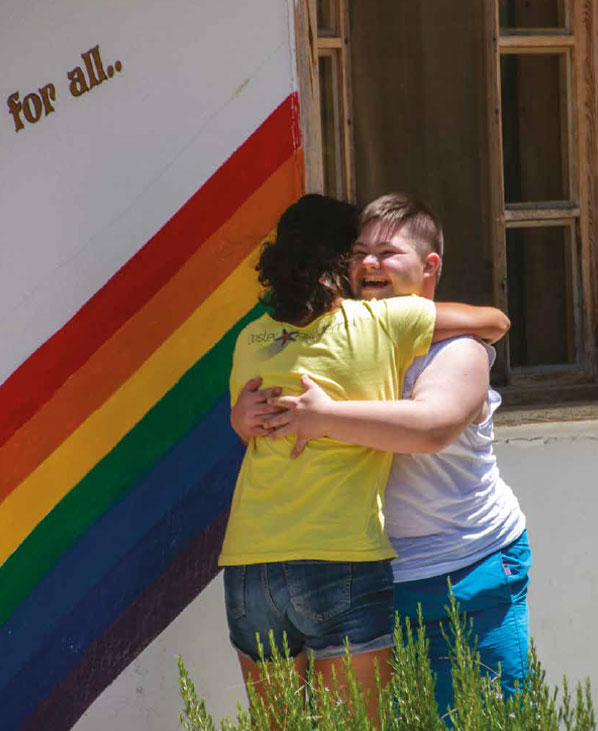
The Dreams Academy was established with the goal of supporting disadvantaged teenagers in their engagement in social and professional life through cooperation between the Alternative Life Association (AYDER) and the United Nations Development Programme with a grant from the Vodafone Foundation of Turkey.
Located at a campus in Çukurbağ village in the forests of Kaş, this place fills a big social void despite its humble appearance. The Dreams Academy is a voluntarism-based space for socialisation where, every summer, the dreams of hundreds of teenagers with disabilities and disadvantages come true. Its main functions are to support persons with disabilities in engaging in social life and developing daily life skills and also to increase awareness among the volunteers. The Dreams Academy helps these teenagers to experience many things that are not normally possible for them, to socialise with each other and the volunteers and to go home with new skills.
People who have been working here as volunteers for a long time define the Dreams Academy in Kaş as a sustainable living space nested in the local community and history.
- 1,300 students, 850 volunteers, 12,000 guests were hosted.
- 100,000 hours of voluntary work was produced.
- 500 people apply every year to become volunteers.
Giving a Voice to The Forest
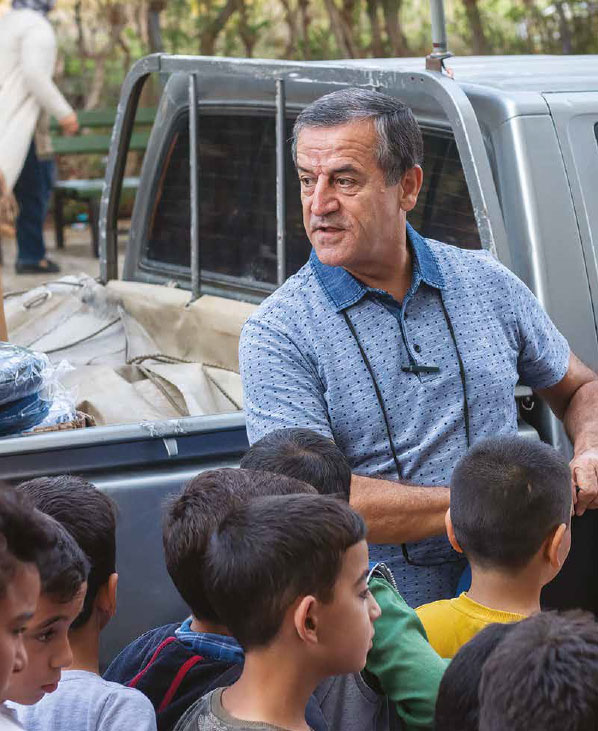
Vehbi Tutmaz is a forestry engineer. It is a profession he has practised passionately for 42 years. He has fought against dozens of fires, losing colleagues in the process, and worked in all the main areas of forestry in Turkey.
Mr Tutmaz has delivered training sessions to villagers and officials from nearby institutions in 50 villages in and around the five pilot areas selected for the Integrated Forest Management in Mediterranean project.
The training sessions on fires were delivered in forest villages by the General Directorate of Forestry of the Ministry of Agriculture and Forestry in cooperation with UNDP with funding from the Global Environment Facility (GEF).
A Story of Will and Solidarity
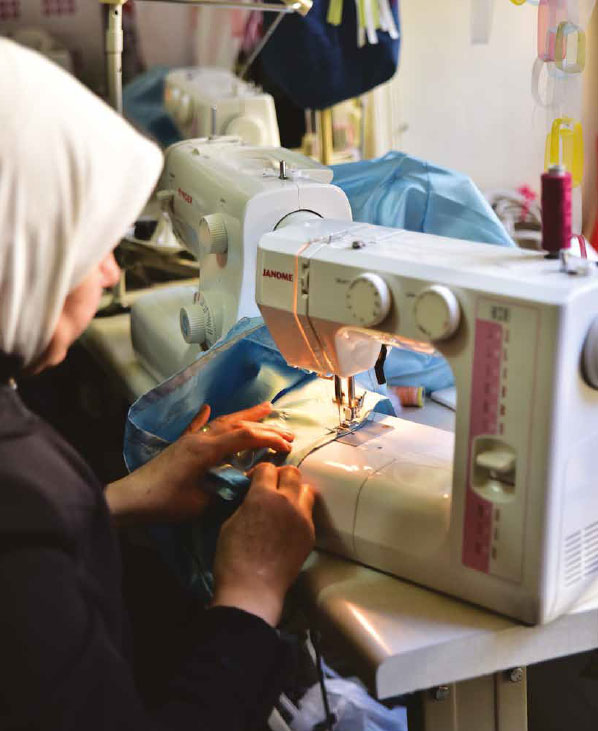
Syrian women in Turkey find a way to carve their own paths and support others.
Kareemat, the “Association of Honourable Women”, was founded in Kilis, Turkey, by Najjla Sheekh, a woman displaced from Aleppo six years ago due to the protracted war in Syria. Beginning with small gatherings among the Syrian women in the city, it later became a full-fledged community centre. Currently, Kareemat hosts over 200 women per day and provides vocational training for various sectors, as well as Turkish and English language courses, to Syrian and local women.
- At Kareemat center, women receive vocational trainings in over 20 fields.
- Through the Programme, 5,100 Syrian women and women in host communities have been reached through the empowerment and social cohesion activities which UNDP has supported in the region since 2015.
Seeds of Hope
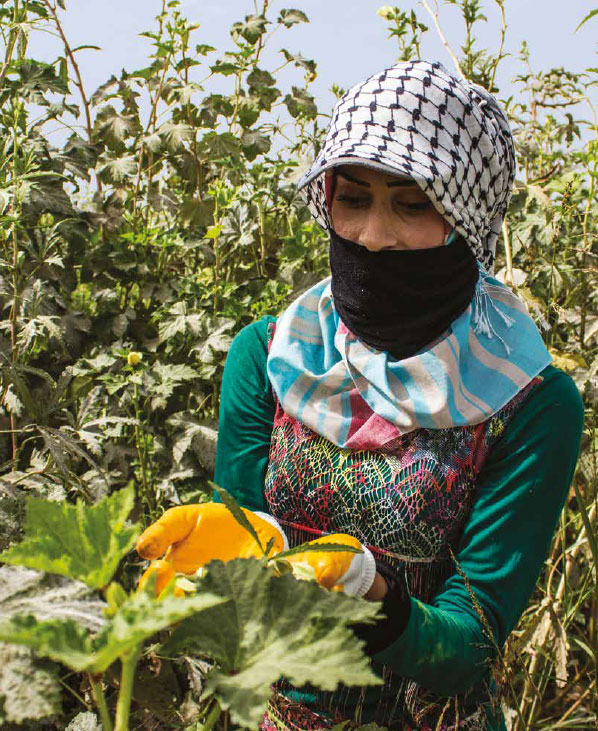
Syrian women take on new roles in the workforce with their rediscovered skills.
Sene Abuhammed, 27, is one of the 3.4 million Syrians who were displaced to Turkey due to the Syria Crisis. While this introductory sentence is no different from many others in the reports and stories we have heard so often over the seven years since the conflict began, there is much that deserves to be told in Sene’s story. She is one of those strong and hard-working women who have had to mobilize all their skills and competencies to build a new life in Turkey and support their families.
Sene came across the vocational training courses provided by the Strengthening Social Stability in the Southeast Anatolia Region project. The project is implemented by UNDP in cooperation with the Southeast Anatolia Project (GAP) Regional Development Administration and is funded by the Government of Japan. Sene improved her agricultural skills at a training course provided by the GAP Agricultural Research Institution.
- Female labour force participation in Syria in 2010: 13%
- Syrian women’s participation to workforce in Turkey: 17%
- Vocational trainings to 8,300+ Syrians and locals.
Lives Changed Through Innovative Approaches
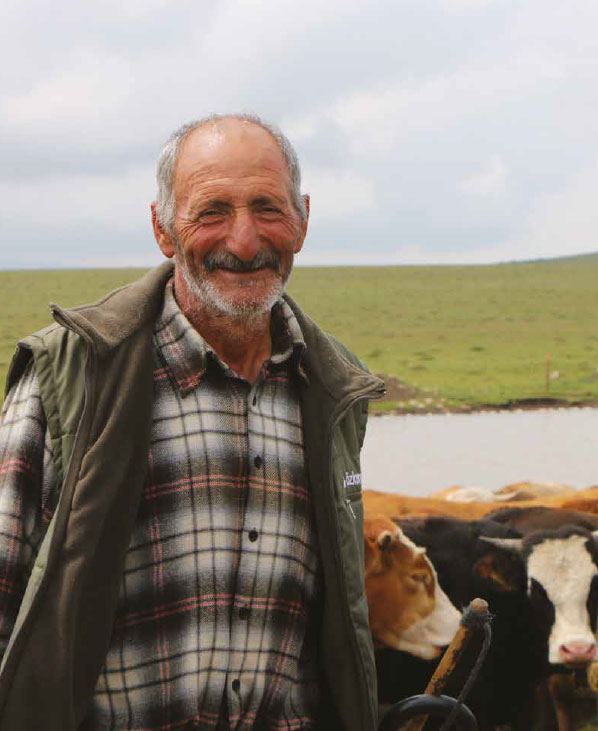
Ardahan, Kars and Artvin are among the least socio-economically developed provinces of Turkey. The rough topography, the high altitude, the long and severe winters, the short growing season and the remoteness of these provinces from other parts of the country all exacerbate socio-economic problems of the rural population.
The Ardahan-Kars-Artvin Development Project (AKADP) is being implemented by the Ministry of Agriculture and Forestry in cooperation with UNDP with funding from the International Fund for Agricultural Development (IFAD).
Mobile Shepperd’s Shelters with Solar Power
At present, there are a total of 86 mobile shepherd’s shelters in use: 61 in Ardahan, 20 in Kars and 5 in Artvin
Modern Livestock Markets Enable Trade in Healthier and Better Conditions
A total of seven livestock markets are to be built in the central, Posof and Hanak districts of Ardahan; the Selim, Sarıkamış and Kağızman districts of Kars; and the Ardanuç district of Artvin.
Women are Happier in Family-Style Greenhouses
Family-style greenhouses aim both to accustom women to raising crops in greenhouses, and to alter the uniform nutrition regime. A total of 82 greenhouses were built : 50 in Ardahan and 32 in Kars.
Triticale is The New Hope For Farmers
Another key element of the Ardahan-Kars-Artvin Development Project (AKADP) is triticale. A hybrid of wheat and rye sown in the fall, triticale is very important for livestock in Kars, because it helps meet the need for quality rough fodder.



